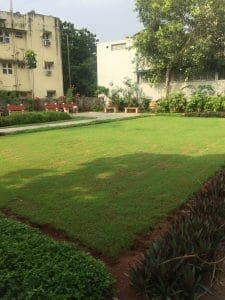The four empty plots behind the Rathnagireeswarar Siva Temple near RBI Quarters in Besant Nagar had become an eyesore for residents of the locality. Owned by the Government Officials Cooperative Housing Society (GOCHS), these lay vacant for years and had been reduced to wasteland, prone to misuse by miscreants, creating a pain for those living in the area.
In August 2015 a set of senior citizens, all members of the GOCHS, led by Colonel Krishnaswami, the President of the Society, decided to pool in funds from individuals and use those plots to create a citizens’ park. It was said that the grounds in fact had a park, almost 25 years back, maintained by the Society then with support from the local branch of Indian Overseas Bank and local shopkeepers.
For reasons unknown to the people, the financial support had stopped and over time, the place grew unkempt and turned into a dumping ground for garbage, polluting the air in and around the locality, including the Shiva temple adjacent to this plot.
Col Krishnaswami took up the cause and called for a meeting of GOCHS members and interested residents who would cooperate and support him in this unique initiative. Over 20 members contributed and came forward to help get this done.
Once the plan was approved by the GOCHS Council, work began full steam. With the help of officials from the Chennai Corporation (primarily the Assistant Engineer and Junior Engineer of the Ward), residents cleared the waste and debris that had accumulated over the years. A compound wall was built and a group of young child artists from the neighbourhood created a theme and painted the wall depicting narratives that stand out brightly even today, two years since the park started its operations.
The next step was to secure water supply. Power connection was obtained and a borewell was dug to supply water to the park.
Once these were taken care of, the core GOCHS team got the landscaping done with the help of residents.
Today, it is a matter of pride for the community that all this — from resource mobilisation to the actual creation of the park — was achieved in just 12 weeks. The park was opened to the people on August 15, 2015, on a milestone day for our nation.
There was initially some resistance from anti-social elements who had been exploiting the land for close to 25 years, but the Colonel took the help of the Corporation and other civic bodies to overcome all obstacles and bring the project to a successful closure.
Today, the park provides a green lung space and a healthy recreational spot not just for senior citizens of the GOCHS, but even for the common man from Besant Nagar at large. The team behind the project hopes that in time, more and more people from nearby areas will come to know of it and visit, adding to the vibrancy of the area.
The park also stands as testament to the power of citizens to improve their surroundings if they take ownership. If they decide to take concrete steps to improve things in the area in which they live, or to create a nice place to live in as a community, it is possible to make that happen. All it takes is commitment and a method.
